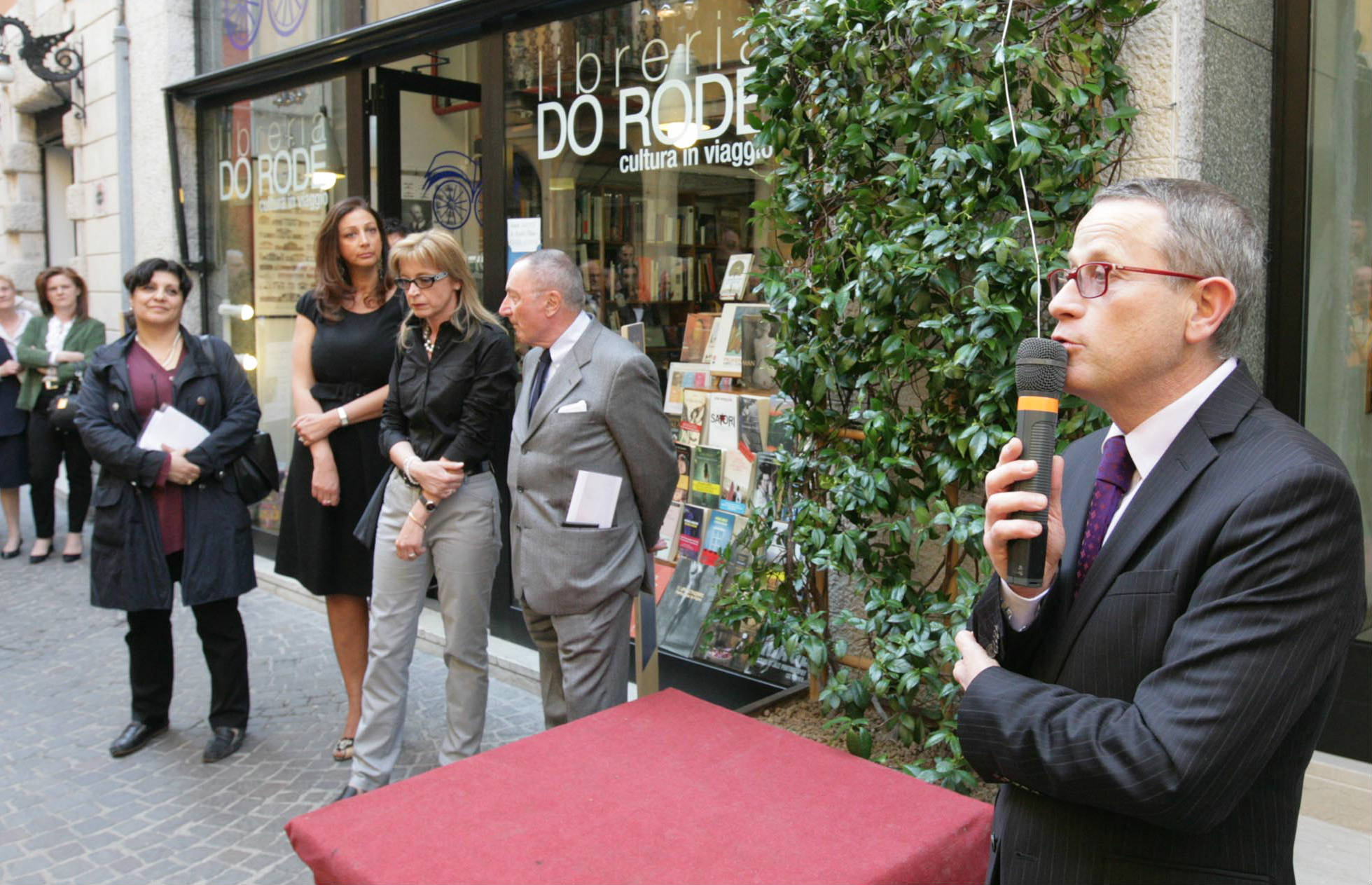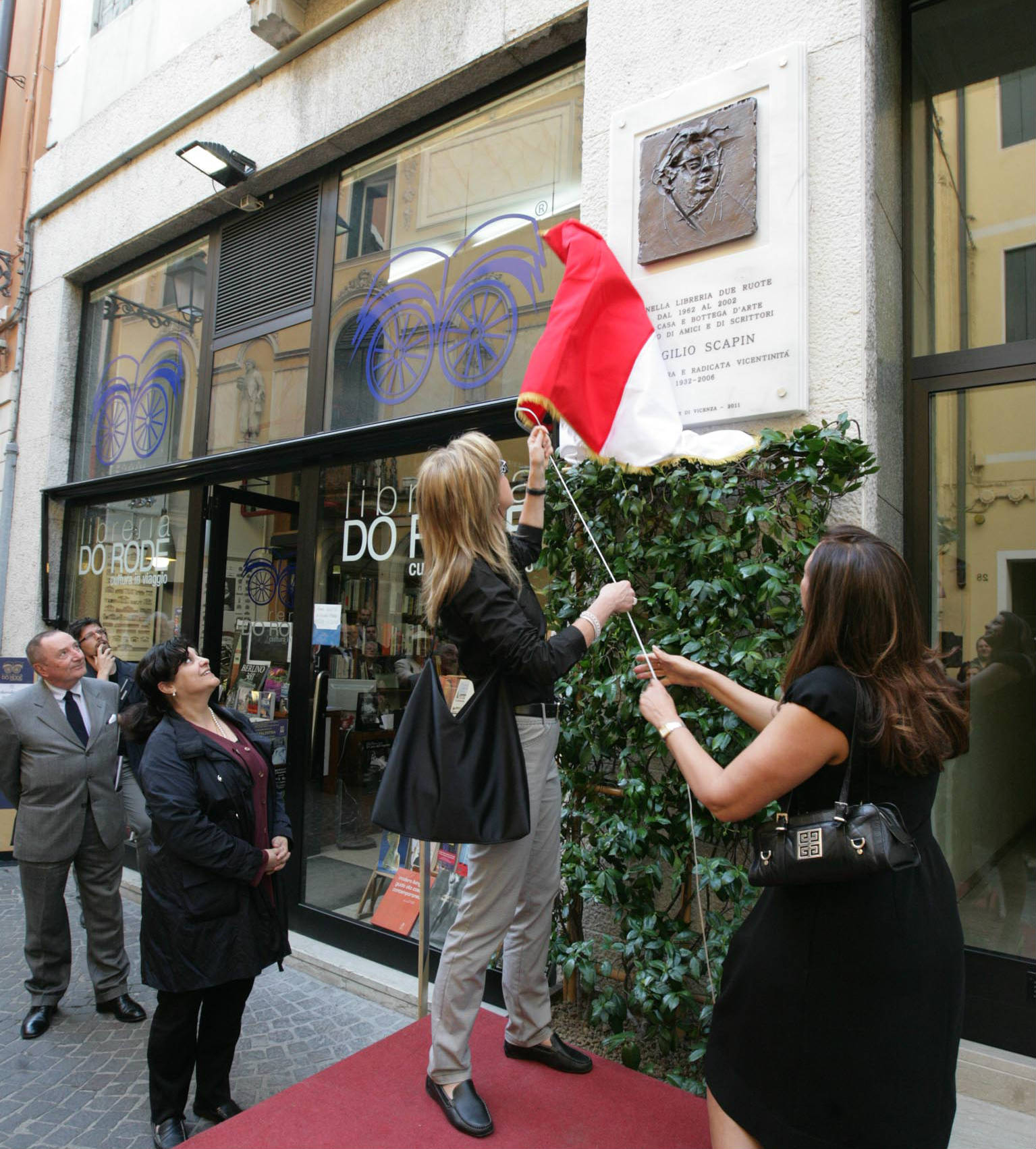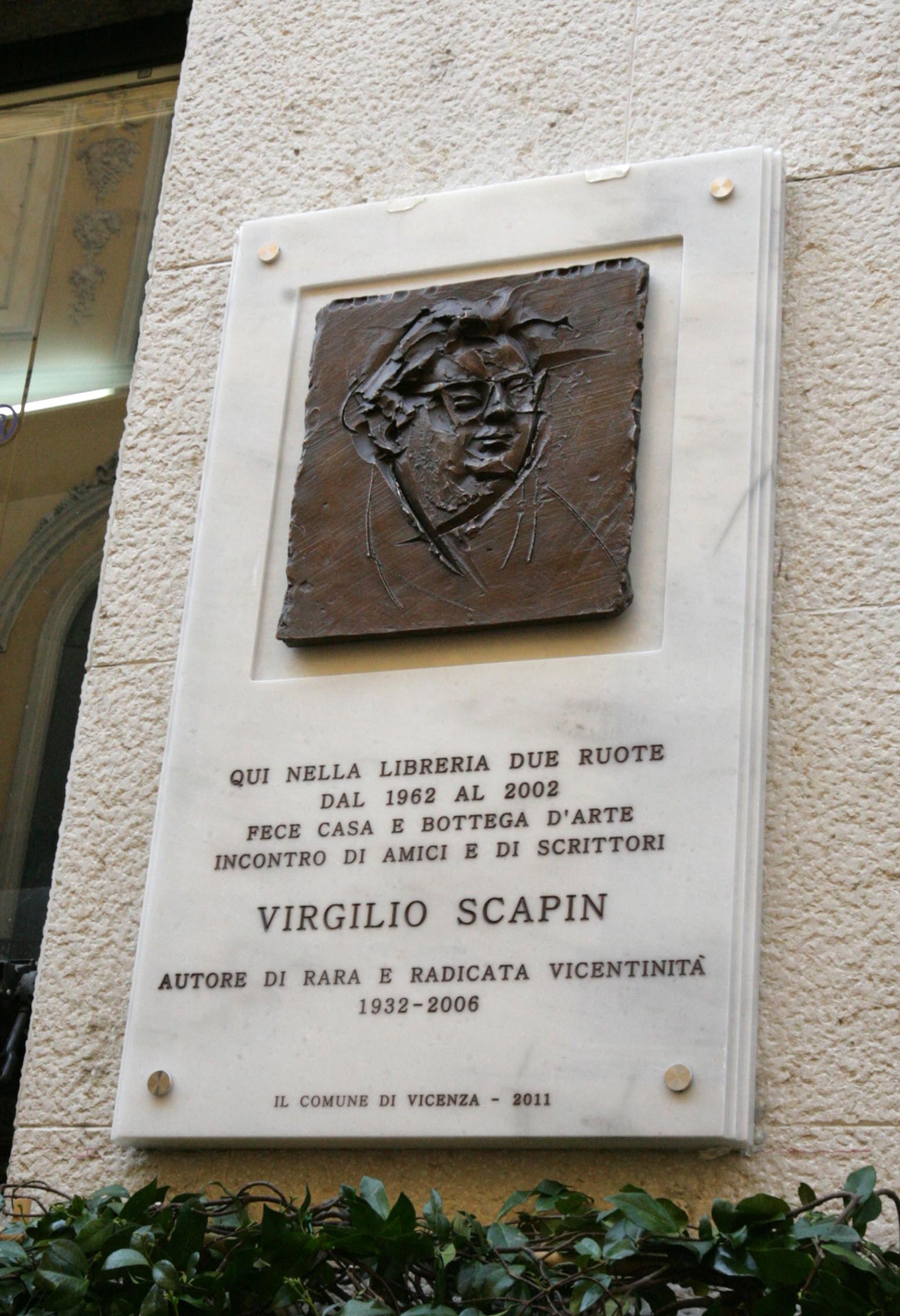SPEECH OF COMMEMORATION on May 6th at VIRGILIO SCAPIN in VICENZA



Good evening all of you who have come in great numbers to discover the tombstone in what was forty years the library Two Wheels and that you are now present at this commemoration. What we have commemorated in Contrà Do Rode and that we are now commemorating here in the stucco hall is in fulfillment of a duty that we felt ours in remembrance of Virgilio. Having the task of illustrating this initiative, I believe I must, first of all say that each and every idea, too, has had some inspiration. It has its origins in Ca ‘Foscari, to which the memory of Virgilio as “the prof.” Perosa, whom we thank for his presence with which he honors the memory of Virgilio Scapin.
Ca ‘Foscari was the university where Virgilio studied, where he studied and taught for his whole life as a professor. Perosa, and it was the University of Silvio Trentin which taught public law until the promulgation in 1926 of the fascist laws that forced university professors to take the oath of fidelity to fascism. There were only three professors in Italy who refused to take the oath and preferred the path of exile: Nitti, Salvemini and Trentin.
Lawyer, deputy and professor, Trentin left in 1926 for the south of France to become a farmer and then a typographer.
When he was fired he opened a bookstore in Toulouse, the “librairie du Languedoc”, which became as Emilio Lussu wrote, a kind of Italian embassy, a point of reference for all Italians – as nenni and the Rosselli brothers – exiles in France and for the intellectuals of Toulouse. After the death of Trentin, the city of Toulouse wanted a memorial stone to be placed outside the famous “librairie du Languedoc” to remember what it was from 1934 to 1943. From that example we wanted to remember first of all the two-wheel bookstore gallery and the place of culture that it was for forty years from 1962 to 2002 and that according to vicenza represented according to Fernando Bandini “a lively update of our city, a fresh wind of ruinization. “
A prestigious bookshop starting from its famous inauguration on the occasion of which Goffredo Parise pronounced the famous parable on the vicentinity entitled “an unlikely dream” in the presence of Guido Piovene and Fernando Bandini. A presentation that the author of the “dead boy and comets” concluded with these words: “my wish is that it is a library of thought and not of products. For Vicenza, an intellectual city, truly intellectual, with a modern conscience, but very much in nuce, this bookshelf represents an important event, in a very moving way. ” So Virgilio became a bookseller and began the adventure of his life.
And we know what the library with its tubini architect balcony and the basement for art exhibitions meant for the city, as Sergio Perosa recalled in his words carved on the tombstone. In its realization and its location, made possible thanks to the immediate consent of the ladies Nicolato owners of the shop – and we thank – the municipality wanted to make a choice that went to the heart of the world that was Scapin and this is for the choice of the place both for the identification of the authors – Quaglia and Perosa – meaning to commemorate not only the illustrious fellow citizen, that the city wanted to be buried in the famedio, but also that library from which the greatest writers of the late twentieth century passed. Perosa wrote, “We wanted the tombstone to be placed right there where Virgilio made his home and shop.” Aside from Sundays, Virgilio, was always there.
Virgilio, you know, was not a traveler and he rarely went on holiday. He was never ashamed of that fact, indeed he has always prided himself on being faithful to his residence in Vicenza. Wanting to go deep into the world of Virgilio, were therefore two of his great long time friends -Nereo Quaglia and Sergio Perosa precisely- to compose it and will remind them to those who will pass for Contrà Do Rode: with the bas-relief of 1971 and with the commemorative epigraph dictated by the illustrious historian and critic of Anglo-American literature by Ca ‘Foscari who shared his studies at the University of Venice with Scapin. All this on a splendid slab of crystalline marble with quartz veins coming from Turkey, from an area between the marmara sea and the Aegean Sea, weighing over 150 kg.
The bronze caricature effigy, that Quaglia has preserved for forty years in his studio and which now gives generously to the city, underlines both the deep friendship that has always linked Scapin to Quagliato and also the fact that that sculpture, in the terracotta version, was very much loved by Virgilio who has always had it in the living room of his house in Contrà S. Antonio first and then in Viale Verdi. Therefore, in Nereo Quaglia, all the gratitude of the municipal administration and of the city is due to his generosity which he has repeatedly shown with his recent donations.
I recall that of the fifth station of the Via Crucis for the monument to the sinkholes and the exodus inaugurated in the main cemetery on the occasion of the “day of remembrance” in February. And then the donation made to the hall that will be set up in the Palladian basements of the civic art gallery of the new churches where eight statues donated to our city will be exhibited.
And again the donation for the room set up in Palazzo Thiene, the historic seat of Banca Popolare. On these donations I would like to say something. In one of his books dedicated to Italy, “La reine albemarle et le dernier touriste”, of which only a few fragments have been preserved, Jean-Paul Sartre recounts the frequent donations that Tintoretto made in Venice because he could not impose himself on Titian. Venice prevailed and lived for almost a hundred years and that was more than a forester while he was from Rialto. It was a way to conquer the scene in a city that preferred Titian. But the gifts of Quagliato are not made to impose themselves. They express all the love of the sculptor for his Vicenza and we can not but express the hope that the city knows how to welcome them with the great availability and profound gratitude they deserve.
The newly discovered tombstone goes to the heart of Virgilio’s life also to the author of the epigraph, Sergio Perosa who lived in Venice in the same room, had the same professors, it was like Virgilio was chosen by Professor Izzo of English literature for a scholarship in Rome and together they left for a study trip to London, so much so that Fernando Bandini was told that the story of their partnership “would be a matter of novels”. And here in the stucco room will be the same Perosa and Walter Stefani, the memorialist who succeeded him in the role of prior of the brotherhood of the Venerable Brotherhood of Baccalà, who will enter with their interventions to evoke respectively the friendship of the youthful years at Ca ‘ Foscari and the subsequent years of Scapin. In one case and in the other one, both the writer, the bookseller, the actor, the prior will contribute to a better knowledge of Vicenza.
We will remember his great love for the countryside, his great love for life. He was a great friend of the whole Vicentina community where he played the role of a popular and authentic figure. He sent us a contagious joy of living because Virgilio was one of those characters who found his happiness in living together with others. We all felt the need of his generous vitality, so now that Virgilio is no longer, we feel his absence. On the occasion of the celebrations for the 150 ° of the unification of Italy I happened to participate in a commemoration of Emilio Franzina who made the “go thought” sing to the Public.
I also sang and I felt a feeling of comotion. in a Proustian way, I looked for the reasons for that emotion and I discovered that my “Madeleine” was the memory of Virgilio that in Firmino’s Caneva made us sing “va pensiero”. It was a “va pensiero” that I would call didactic-pedagogic because before he ended every verse, Virgilio anticipated the beginning of the next Verse. With his “va ti posar”, “ove olezzano”, “l’aure dolci”, “del giordano”, He led those improvised choirs of unlikely tenors and lows until the “infuse” finale without any loss despite the vespaiolo of Firmino.
For over 40 years he has been a fundamental figure of the Vicentine cultural Life. We remember the literary prolificity despite the work in the bookstore and his seven books remain something that his death can not take away from us. He was an authentic figure, that we all knew as a good and generous person, popular and loved by us, Vicentini. Godfrey Parise wrote about him: “to goodness is added generosity.” and Virgilio always repeated to those who thanked him for something That: “whoever has to have has to give” in an interview, to those who asked Him: “what kind of boy were you?”, he replied: “good, very good. I was like this: naïve, candid without claws, a chubby boy at the mercy of all perfidity. ” He said if there were robbers in the bookstore, he would have to count them the money he had in the Crate. And the Vicentini who gave him the last affectionate greeting in a cathedral filled with friends acknowledged in him the words with which Parise had described him forty years earlier, in 1958: “almost as if his destiny were to smile at all and at all as if evil , which also exists, was not to be taken at all in consideration with respect to the good which makes it a Match. “thank you Virgilio!
Pio Serafin


